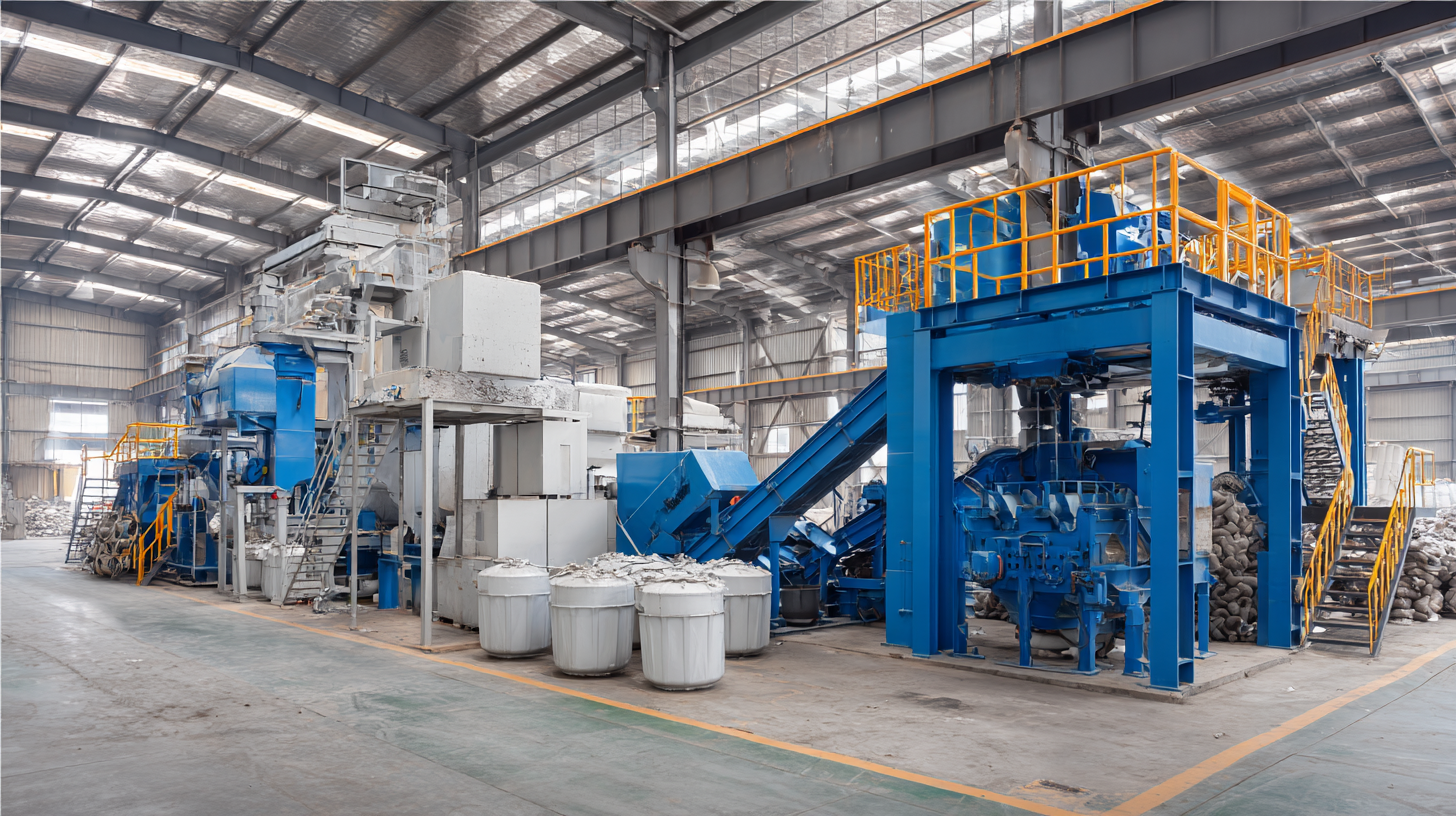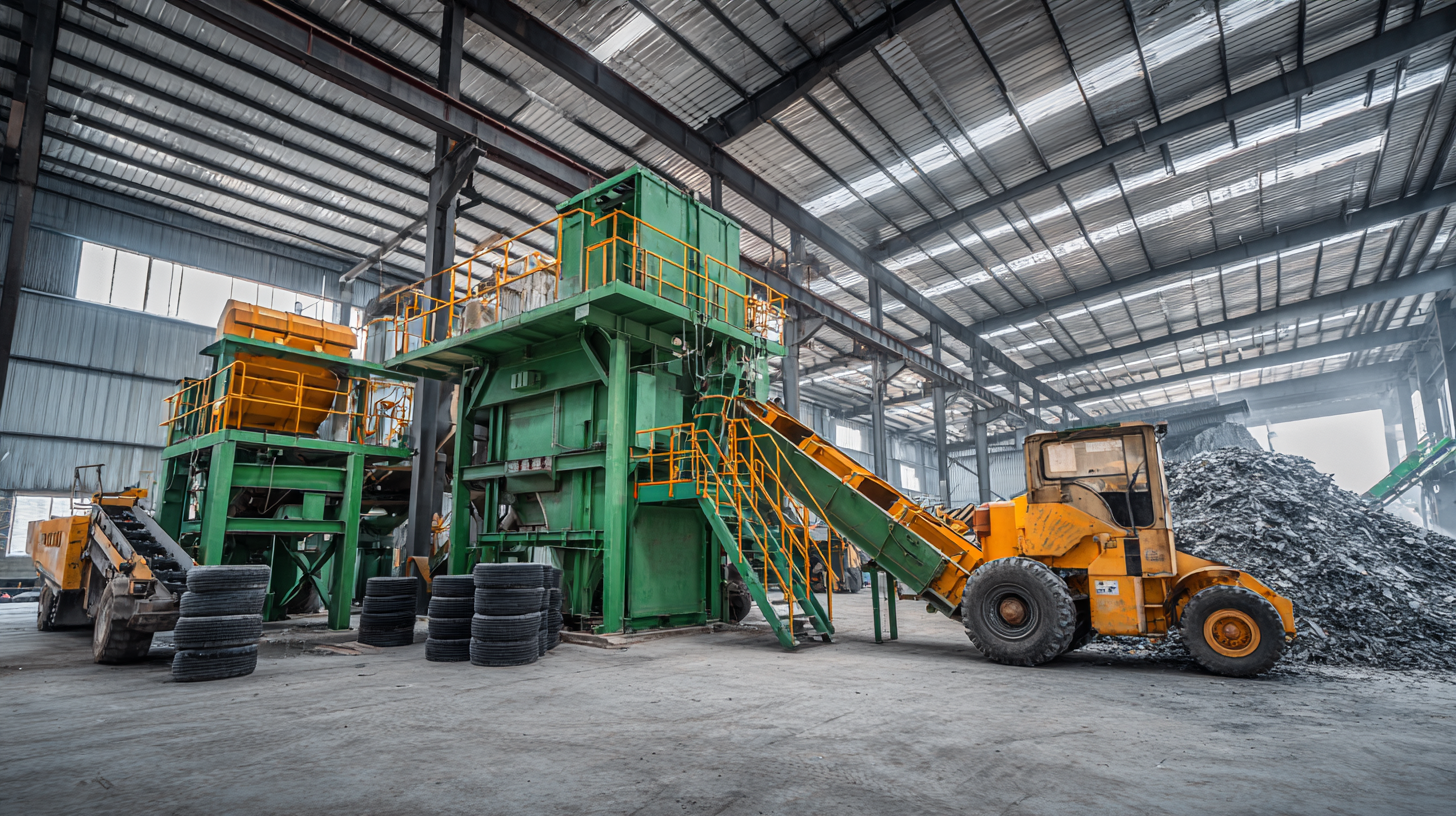In recent years, the tire recycling industry has witnessed significant growth, driven by rising environmental concerns and the increasing volume of waste tires. According to a report by MarketsandMarkets, the global tire recycling market is projected to reach USD 6.6 billion by 2025, with a compound annual growth rate (CAGR) of 3.9% during the forecast period. Central to this industry's advancement is the Small Tire Shredder, which plays a crucial role in the initial breakdown of tires into smaller, more manageable pieces for further processing.
 Chinese manufacturers have established themselves as leaders in this sector, offering innovative solutions that prioritize efficiency and sustainability. By unlocking global partnerships with these esteemed manufacturing facilities, businesses can harness cutting-edge technology and superior craftsmanship, ultimately enhancing their operational capabilities and contributing to a greener planet.
Chinese manufacturers have established themselves as leaders in this sector, offering innovative solutions that prioritize efficiency and sustainability. By unlocking global partnerships with these esteemed manufacturing facilities, businesses can harness cutting-edge technology and superior craftsmanship, ultimately enhancing their operational capabilities and contributing to a greener planet.
As the global waste management industry evolves, small tire shredder manufacturing has emerged as a pivotal focus in China. Recent reports highlight that the Asia-Pacific region, particularly China, is poised to dominate the small tire shredding equipment market, with an anticipated compound annual growth rate (CAGR) of over 6.5% from 2023 to 2030. This growth is driven by increased environmental regulations and a rising demand for recyclable materials. Shredded tires, once considered waste, are now being transformed into valuable resources for various industries, including construction and energy.
To capitalize on these trends, manufacturers are embracing advanced technologies that enhance productivity while minimizing environmental impact. For those looking to invest in small tire shredders, consider choosing models equipped with high-efficiency motors and noise-reduction systems, which not only improve operational effectiveness but also comply with stringent sustainability standards. Additionally, opting for equipment that offers adaptability to different tire sizes can significantly broaden your operational capabilities.
Emerging trends also indicate a shift towards automation and smart manufacturing in this sector. Incorporating IoT technology in shredding processes allows for real-time monitoring and maintenance alerts, which can prevent costly downtimes. As the market continues to mature, staying ahead of these technological advancements will be crucial for manufacturers seeking to lead in the small tire shredder manufacturing landscape.
As the world increasingly focuses on sustainability, the demand for tire recycling solutions has surged in 2023. The rising awareness of environmental issues and government regulations on waste management have driven companies to seek effective ways to recycle used tires. This year's market analysis reveals significant growth opportunities for businesses involved in tire shredding and recycling technologies, particularly in developing regions where waste management practices are still evolving.
The tire recycling industry is evolving rapidly, spurred by advances in manufacturing technologies, such as those seen in small tire shredders. These machines are crucial for breaking down tires efficiently, making it easier to convert them into reusable materials. As global partnerships are forged, particularly with manufacturers in China who excel in producing these shredders, companies can enhance their operational capabilities and expand their market reach. By leveraging innovative technology and strategic alliances, businesses can not only increase their competitiveness but also contribute positively to the recycling ecosystem, addressing both economic and environmental challenges simultaneously.
 The landscape of tire recycling is undergoing a remarkable transformation, largely driven by technological innovations in Chinese small tire shredder manufacturing. These advanced machines not only enhance efficiency but also minimize environmental impact, supporting sustainable practices within the industry. Innovations such as precision engineering and automated controls have significantly improved the shredding process, allowing for consistent output quality and reduced operational costs.
The landscape of tire recycling is undergoing a remarkable transformation, largely driven by technological innovations in Chinese small tire shredder manufacturing. These advanced machines not only enhance efficiency but also minimize environmental impact, supporting sustainable practices within the industry. Innovations such as precision engineering and automated controls have significantly improved the shredding process, allowing for consistent output quality and reduced operational costs.
When considering the integration of these shredders into your operation, here are a couple of tips:
1. Prioritize Energy Efficiency: Look for models that consume less energy while maintaining high performance. This not only reduces operational costs but also supports eco-friendly initiatives.
2. Invest in Quality Technologies: Select shredders equipped with advanced features like smart monitoring systems and modular designs. These technologies enhance maintenance ease and increase machine lifespan.
As the demand for tire recycling grows globally, embracing these innovations positions businesses to thrive in a competitive market while contributing to healthier ecosystems. The future of tire recycling is indeed bright, fueled by ongoing advancements in manufacturing processes and technologies.
Collaborating with Chinese manufacturers for tire shredding systems offers numerous benefits that can significantly enhance operational efficiency and cost-effectiveness. Firstly, Chinese manufacturers are renowned for their advanced technology and innovative designs in the field of tire shredding. By partnering with them, companies can gain access to state-of-the-art machinery that incorporates the latest advancements, ensuring superior performance and reduced downtime.

Additionally, the cost advantages associated with collaborating with Chinese manufacturers cannot be overlooked. Not only do these manufacturers provide high-quality products at competitive prices, but they also offer flexible solutions tailored to specific business needs. This capacity for customization allows companies to optimize their tire recycling processes, leading to increased profitability. Furthermore, the fast production times typical of Chinese manufacturing allow businesses to scale operations quickly and adapt to market demands, ensuring a timely response to evolving industry needs. By leveraging these partnerships, companies can unlock new growth opportunities while maintaining a focus on sustainability and environmental responsibility.
The regulatory landscape surrounding tire recycling and shredder production is shaping the future of global partnerships in this sector. As nations become increasingly aware of environmental issues, regulations are evolving to promote sustainable waste management practices. This shift is influenced by both local policies and international agreements that seek to minimize landfill contributions and enhance recycling rates. Understanding these regulations is crucial for businesses aiming to establish partnerships in the increasingly competitive landscape of tire recycling and shredder manufacturing.
The European waste shredder market reflects this trend, with projections indicating significant growth from USD 251.4 million in 2025 to USD 344.5 million by 2035. As businesses navigate the intricacies of compliance and market demands, the need for high-quality manufacturing, such as that provided by Chinese enterprises, becomes evident. The synergy between stringent regulatory frameworks and advanced manufacturing capabilities can foster collaborations that not only meet compliance standards but also drive innovation and efficiency in tire recycling practices. Thus, the interplay between regulation and manufacturing excellence is critical in unlocking successful global partnerships in this essential industry.
